Fertility

Fertility is the ability of a woman to conceive a child, that is, the process by which an egg is fertilized by a sperm on a fertile day. Every day we observe more couples with fertility problems, which diminishes their ability to have children and to form the family they have long dreamed of.
Statistically, it was said that the possibility of having children per family was located at about 5.2 children per family in the 60s and 70s, in recent years, we have seen how the fertility rate per family is less than three children for each family in the best of cases, this is due to many causes, among which, some of the most common is some organic damage, or advanced age of the patients at the time of conceiving. This last factor is mainly due to the fact that couples increasingly postpone the arrival of their children, due to their jobs, the need to continue cultivating as professionals and the series of occupations typical of the different technological advances that consume the most of our time.
Fertility Treatments
Fertility treatments are divided into two groups: Low complexity fertility treatments: such as programmed intercourse (having sex during the periods of greatest ovulation, whether there is stimulation by hormones or not) or artificial or intrauterine insemination (introduction of semen previously treated in a laboratory in utero). High complexity fertility treatments, such as in vitro fertilization, ICSI (intra-cytoplasmic sperm micro injection), PGD pre-implantation genetic diagnosis (used to determine if there are genetic alterations in the embryos before being transplanted), donation of ovules, surrogacy or surrogacy, freezing of semen and eggs.
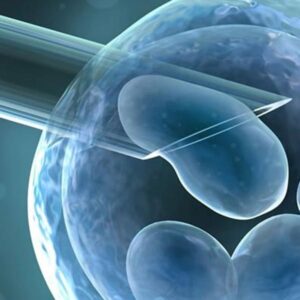
In Vitro Fertilization
In Vitro Fertilization or IVF, is a procedure in which a group of fertility specialists and assisted reproductive biologists will take the eggs and sperm of the future parents, and allow under special conditions in our clinic the union of both to achieve form a small embryo, which will later be transplanted into the mother’s uterus so that it is implanted there. Later, after 15 days, the pregnancy test is done to know the final result of said procedure.
In Vitro Fertilization is a procedure that is generally applied to those couples who, after being studied, rule out the possibility of pregnancy by natural means or by low complexity procedures with artificial insemination. This is a highly complex procedure within Fertility, because the clinic’s laboratory is going to become the woman’s tube, which is where natural fertilization occurs.
ICSI
ICSI is the intracytoplasmic injection of sperm, that is, placing a sperm that has been carefully selected by biologists specializing in assisted reproduction in our fertility laboratory inside the egg.
In the case of ICSI, biologists must select the best sperm and place it with a special needle inside the ovum, in this case, the evolution of this encounter must be waited, as in IVF, to verify if there was fertilization and transfer three to five days later the embryos to the mother’s womb. The process after this consists of waiting 15 days for the pregnancy test.
This procedure is generally applied to couples where the quality and quantity of sperm is very low or compromised, it is also indicated for women with a very low egg reserve, elderly women or those with pathologies such as Polycystic Ovarian Syndrome or Endometriosis , the ovum, has the most important task in fertility, and one of them is precisely to repair the genetic alterations that the sperm brings, always, you must have the best quality eggs to achieve a good embryo with a high capacity to become pregnant and to result in a healthy baby.
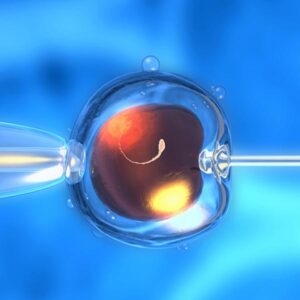
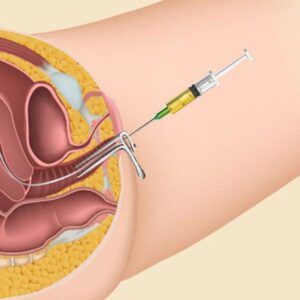
Artificial Insemination
Artificial or Intrauterine Insemination consists of placing semen previously processed in our andrology laboratory inside the uterine cavity, with the help of a special cannula. The purpose of this procedure is to bring the sperm as close as possible to the orifices of the tubes, so that they reach the ovum faster at the appropriate place in the fallopian troop where fertilization occurs.
Artificial Insemination is a procedure that has specific indications, such as patients who have adequate ovulation, whose tubes are permeable, who do not have infectious processes of the uterine cavity, in whom there are no endometrial polyps, or anatomical defects of the uterine cavity, and in those men where the number of motile spermatozoa recovered is greater than 10 million.
Although artificial insemination is a procedure considered of low complexity, it is necessary that patients have as an inescapable rule the performance of hysterosalpingography, you should never go to an artificial or intrauterine insemination if you do not know if your tubes are permeable, the second A condition that cannot be stopped being investigated is a spermogram, because it is vital to know the quality of the semen sample and the amount of sperm, because with less than 10 million sperm, the procedure indicated is an In Vitro fertilization and not a Artificial insemination.
Scheduled Sexual Intercourse
Once all the fertility tests have been performed, as long as your tubes are permeable, the uterine cavity and ovaries are fine, as are your hormones, and your husband’s semen has a Motile Sperm Recovery (REM) greater than 20 million, you can go to scheduled relationships, here the ideal is to know what your fertile days are and schedule sexual relations for that date, in this way we increase your chance of pregnancy.


Fertility Study Plan
The complete evaluation of both members of the couple is essential to have an accurate diagnosis of the infertility condition and to be able to offer patients the best treatment alternatives.
You should never start any fertility treatment without first having performed all the studies.
Testicular Biopsy
Testicular biopsy is performed in those patients where sperm cannot be found in the ejaculate and those who retain an adequate testicular volume and fertility hormones at normal levels.
Many times, although the man is azoozpermic (without sperm in the ejaculate), we can find sperm in the testicle itself and with them achieve a pregnancy.
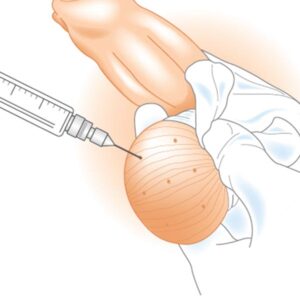
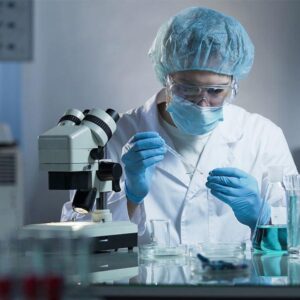
Genetic testing
We offer you a wide range of genetic tests:
- Study of the embryo before implantation, or also called PGD or, Preimplantation Genetic Diagnosis, with this test you will be able to know if your baby is healthy or not and select the sex of the same before implanting it.
- Once pregnant, you can do the genetic analysis of your baby, for this purpose we have tests that range from the analysis of 5 chromosomes, to those that are capable of analyzing the 23 pairs of chromosomes and the microdelections (minor alterations of them), that are compatible with multiple pathologies. These tests are not invasive, that is, they are carried out by obtaining a peripheral blood sample from the pregnant woman, this, thanks to the fact that by week 10 of pregnancy, the embryo has passed enough genetic material into the maternal blood to be able to be analyzed No problem.
- Preconception study or Family test. This study gives you the opportunity to know more than 600 heritable diseases that could be transmitted in a dominant or recessive way to your baby, and you will know the percentage of possibility that your child suffers them depending on the genetic load contributed by both parents. This study is also applicable to any member of the family, at any age, as long as you want to know their early risk of suffering from any disease to take the necessary preventive measures.
- Analysis of the BRACA 1 and BRACA 2 genes, these tests carried out on blood allow us to know the real possibility that a person has of suffering from breast, colon, uterine or ovarian cancer.
Infertility is the inability to conceive a pregnancy, after having sexual intercourse during the fertile days and in a period of one year, without the use of contraceptive methods.
A couple of childbearing age requires at least 168 intercourse a year (on average an inter-day sexual relationship) to talk about their sexual life being active and with a high probability of pregnancy. Considering the above, if after this time, they do not achieve pregnancy, the couple must undergo infertility studies, and both must attend.
The moment varies according to each particular case, if it is a healthy couple, under 35 years of age, without a history of diseases such as: diabetes, blood problems, hormonal alterations, trauma to the testicles, surgeries on the cervix, uterus, ovaries or pelvis , without a history of treatment for any type of cancer, etc., you can wait a year before going to a specialized fertility consultation. If, on the other hand, you are over 35 years old, and / or any of the previous antecedents, you must wait a maximum of 6 months, if you are 38 years old or more, you must go immediately, because, women, after 35 years , we fall into a very marked reduction in fertility, and at 38 years old, our natural fertility rate per month is less than 15%.
The causes of infertility must be analyzed in both men and women separately. In the case of men, the most frequent are:
Abnormal sperm production, either due to undescended testicles, trauma, hormonal disorders, surgeries on the testicles due to varicoceles, hydrocele or genetic defects.
History of diabetes, infections such as Gonorrhea, Chlamydia, Mumps, or HIV.
Problems with sperm delivery due to sexual problems, such as premature ejaculation; certain genetic diseases, such as cystic fibrosis; structural problems, such as a blockage in the testicle; or damage or injury to reproductive organs.
Overexposure to certain environmental factors, such as pesticides and other chemicals, and radiation. Smoking cigarettes, drinking alcohol, taking marijuana, or taking certain medications, such as select antibiotics, antihypertensives, anabolic steroids, or others, can also affect fertility. Frequent exposure to heat, such as in saunas or hot tubs, can raise core body temperature and thus affect sperm production.
Damage related to cancer and its treatment, including radiation or chemotherapy. Cancer treatment can affect sperm production, sometimes severely.
In women we can mention:
Disorders in ovulation
Hormonal alterations
Obstruction of the uterine tubes
Defects in the uterine cavity
Chronic infections of the vagina, uterus and pelvis
Endometriosis
Polycystic ovary syndrome
Uterine myomatosis.
Premature ovarian failure
Age of the woman.
Cancer history
In the case of men, the appropriate age to become parents is one that is below 40 years, as reflected in the latest study carried out by scientists from the University of California (United States), in more than 90 men between the ages of 22 and 80, who did not present any health or fertility problems. In this study it was possible to show that the man, as he advances in age, loses the motility of the spermatozoa and also, the alterations in his structure increase. This study showed that after 40 years of age, infertility in men is 60 to 85%.
In the case of women, fertility begins to decrease dramatically after age 35, with the possibility of being a mother with your own eggs after age 40 falling below 15%, however, women can opt for egg donation , and in this case, the maximum recommended age to get pregnant is 50 years.
